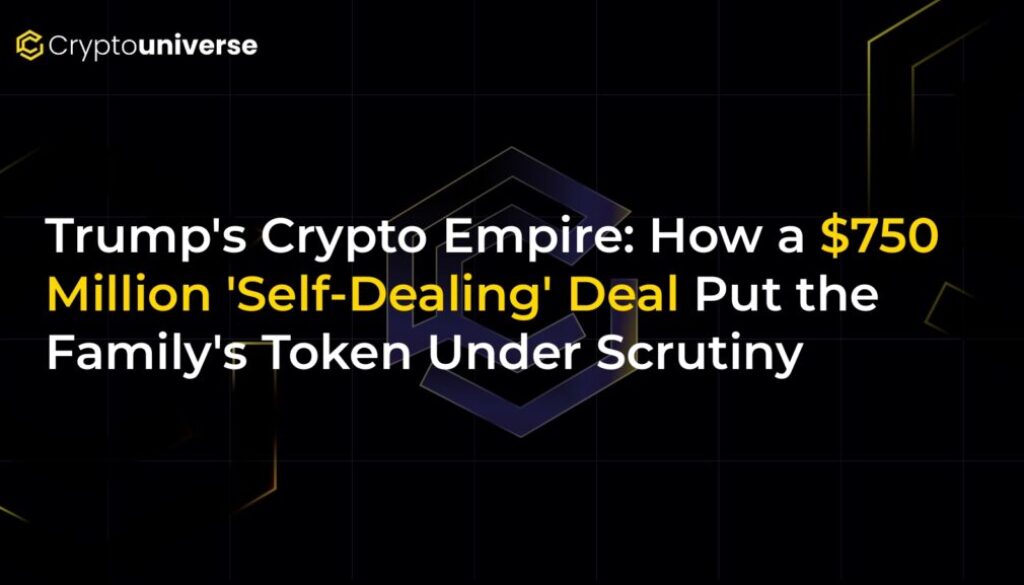Trump’s Crypto Empire: How a $750 Million ‘Self-Dealing’ Deal Put the Family’s Token Under Scrutiny

The Unprecedented Fusion of Politics and Crypto
In a world where headlines are fleeting, the convergence of presidential politics and the volatile crypto market has created a story that refuses to fade. Donald Trump, once a crypto skeptic, has pivoted dramatically, not just by accepting crypto donations but by building a digital asset empire. At the center of this new venture is a web of deals, family involvement, and a flagship token project that has raised serious red flags for investors and political watchdogs alike. The most glaring of these is a massive transaction that looks suspiciously like the family firm buying its own product to inflate its value, sparking intense scrutiny over a potential <$750 million crypto deal> and the ethics behind it.
Introducing World Liberty Financial (WLFI): The Trump Family’s “Crypto Dollar”
The Trump family’s foray into the digital frontier is spearheaded by a project named World Liberty Financial, with its native token, WLFI. Promoted as the next-generation “crypto dollar,” the project has ambitious goals. However, leaked documents and on-chain analysis paint a picture of a tightly controlled operation designed for maximum insider profit.
According to reports circulating online, the profit and ownership structure is heavily skewed:
- Donald J. Trump: Listed as Chief Guideline Officer with a reported 60% ownership and a staggering 75% share of the profits.
- Eric Trump & Donald Trump Jr.: Positioned as Web3 Ambassadors, leveraging their public profiles to promote the venture. Eric Trump is also noted as a director at ALT5 Sigma, a key firm in these transactions.
- Barron Trump: Even the youngest Trump is listed with a role in DeFi (Decentralized Finance), signaling a full family commitment.
This structure ensures that the vast majority of any financial upside flows directly back to the family and its inner circle, a fact that has become central to the controversy.
The Heart of the Controversy: A Multi-Million Dollar Self-Purchase?
The primary allegation causing a stir in both financial and political circles is that World Liberty Financial used a partner firm, Alt5 Sigma, to buy up its own WLFI tokens just before the public debut. This practice, often called self-dealing or a form of wash trading, creates a facade of high demand and inflates the asset’s price artificially.
Here’s why this is a major red flag:
- Artificial Valuation: By buying its own tokens, the project can create a paper valuation that is not based on genuine market interest. Reports suggest this maneuver rocketed the family’s paper holdings to nearly $6 billion.
- Misleading Investors: Public investors see a soaring price and assume organic growth, leading them to buy in at inflated values while insiders hold the majority of the supply.
- Market Manipulation: This is a classic tactic to manipulate a market. In regulated securities markets, it’s illegal. In the Wild West of crypto, it exists in a gray area that regulators are increasingly targeting.
This single act turns the project from a potentially innovative financial tool into what critics are calling a private cash machine, built on hype and questionable financial engineering.
A Pattern of Questionable Deals and “Pay-for-Play” Allegations
The scrutiny doesn’t stop with the WLFI token sale. The Trump family’s crypto activities are intertwined with other eyebrow-raising events that suggest a pattern of leveraging political influence for financial gain.
The Justin Sun Connection
One prominent example involves crypto billionaire Justin Sun. Sun was reportedly under investigation by the SEC. Following a private dinner with Donald Trump and a massive investment of over $75 million into Trump’s crypto company, the SEC reportedly dropped its case against him. Critics immediately labeled this a quid pro quo—a bribe exchanged for regulatory relief. This incident fuels fears that a potential Trump administration could use its power to reward crypto allies and punish foes, undermining the rule of law.
Foreign Entanglements
Further allegations point to a shady crypto deal with the United Arab Emirates (UAE), which supposedly helped propel a Trump-family-linked stablecoin to become the seventh largest in the world. The involvement of foreign governments in the financial dealings of a presidential candidate raises significant national security and corruption concerns. It blurs the line between business and foreign policy, suggesting that diplomatic relationships could be for sale.
Why Watchdogs are Sounding the Alarm
The fusion of the Trump brand with the unregulated, high-risk world of cryptocurrency has created a perfect storm for potential corruption. For regulators and watchdogs, the concerns are clear:
- Unprecedented Conflict of Interest: Can a president regulate an industry from which his family is earning billions? The potential for self-serving policies that benefit the family’s crypto holdings at the expense of public interest is immense.
- Lack of Transparency: The opaque nature of crypto transactions makes it easier to obscure the flow of money, whether from foreign entities, lobbyists, or individuals seeking political favors.
- Risk to Retail Investors: When high-profile figures promote crypto projects tainted by allegations of self-dealing, everyday investors are the ones most likely to be left holding worthless bags when the hype dies down.
Conclusion: A New Era for Crypto and Politics
The Trump family’s pivot from real estate to crypto is more than just a business shift; it’s a fundamental change in the landscape where politics and finance intersect. The allegations surrounding World Liberty Financial and its <$750 million 'self-dealing' deal> are not just about one family’s wealth. They raise critical questions about the future of crypto regulation, the potential for political corruption in the digital age, and the very integrity of our financial and political systems. As the election cycle heats up, the scrutiny on this multi-billion-dollar crypto empire will only intensify, and the answers could define the next chapter for both Washington and Web3.


